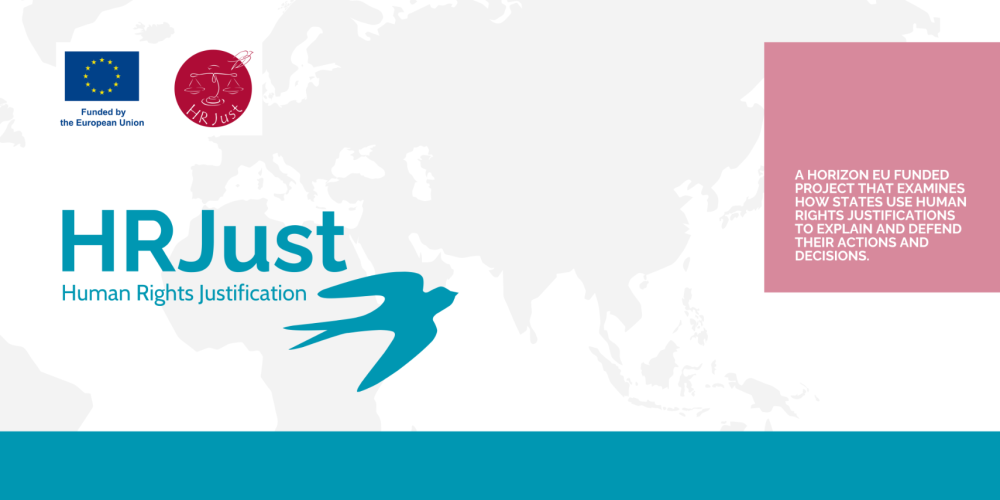States’ Practice of Human Rights Justification: a study in civil society engagement and human rights through the lens of gender and intersectionality (HRJust)
HRJust, A Horizon EU Funded Project, Examines How States Use Human Rights Justifications To Explain And Defend Their Actions And Decisions.

Human Rights Justifications (HRJ) are when States use human rights to justify decisions. Human rights regimes operate on the presumptions that only individual persons can be in possession of human rights. The regulatory gaps occurring when the States use HRJ for their actions are two-fold, one in the regulation of the States’ use of HRJ and one in the individual human rights protection when States use HRJ. This activity is not regulated by any international, regional or national regime. In other words, significant and important gaps in human rights regulations has now been identified, which this project seeks to address. We will develop a theory of HRJ and a process for Systematic Ongoing Civil Society Engagement (SODCSE) as a tool for a gender and intersectional inclusive Civil Society engagement. Through SODCSE, we will identify gaps in human rights regulations and protection, serving as underpinning data for our recommendations to EU in support of a multinational human rights system and promotion of transnational democratic governance. SODCSE will also help us identify geopolitical elements that influence States’ use of HRJ. This will be done through 5 countries: Sweden, Finland, Taiwan, India and Ukraine, through three actions: human rights dialogue, inclusive democratic participations, and protection of human rights defenders, and operationalised through three themes: Covid, Migration and Climate.
- Provider: Horizon Europe (European Commission)
- Project name: States’ Practice of Human Rights Justification: a study in civil society engagement and human rights through the lens of gender and intersectionality (HRJust)
- Registration number: 101094346
- Coordinator of the project: University of Gothenburg (Maria Grahn-Farley)
- Leader of the research team at IIR: Federica Cristani
- Research team (IIR): Federica Cristani, Jan Lhotský, Nikola Schmidt, Elif Naz Němec, Veronika Bílková, Petra Ditrichová
- Implementation period: 1. 3. 2023 - 28. 2. 2026
- Contact person / Senior project manager (IIR): Petr Burda (burda@iir.cz)
- Project's website you can find here.
- Project's social network here: LinkedIn
The European Commission's HORIZON-CL2-2022-DEMOCRACY-01 (Reshaping democracies) call aims to fund research and innovation activities in the field of democracy. Funded projects will contribute to support the European Union’s role in leading the transformation and defence of multilateralism by identifying and analysing policy avenues for a more robust, democratic and effective global governance. It should also develop policy recommendations, institutional frames, toolboxes, narratives and methodologies for supporting action towards transnational democracy.

Souvisejicí centra
Centrum governance nových technologií
Cílem GET je zkoumání vztahu technologií a mezinárodní politiky z interdisciplinárního hlediska, od teorie mezinárodních vztahů, filozofie, sociologie po interakci s mezinárodním právem. Mezi klíčová témata výzkumu se nyní řadí kybernetická a vesmírná bezpečnost s důrazem na témata planetární obrany, těžby asteroidů a využití výkonových laserů pro řadu vesmírných aplikací od úklidu oběžné dráhy po zlomové projekty mezihvězdného cestování. Centrum se zabývá aktivitami od základního výzkumu po policy orientovanou práci (např. formulace vzniku mezinárodního bezpečnostního režimu pro mírové užití laserové technologie ve vesmíru). Jeho členové pravidelně informují veřejnost prostřednictvím médií, pořádají veřejná setkání a mezinárodní workshopy propojující technologický vývoj s politickou vědou. Publikují policy papery a vystupují jako odborníci po boku diplomatických misí v OSN a dalších mezinárodních organizacích.
Centrum mezinárodního práva
CMP provádí výzkum v různých oblastech mezinárodního práva. Hlavní pozornost zaměřuje na lidská práva, mezinárodní humanitární právo, mezinárodní trestní právo, použití síly, boj proti terorismu a teorii mezinárodního práva. Výstupem činnosti Centra jsou jak odborné publikace, tak politicky orientované studie. Studie by měly pomáhat MZV ČR formulovat jeho právní pozice. Tyto studie mají rovněž poskytnout informace o mezinárodním právu veřejnosti a médiím.
